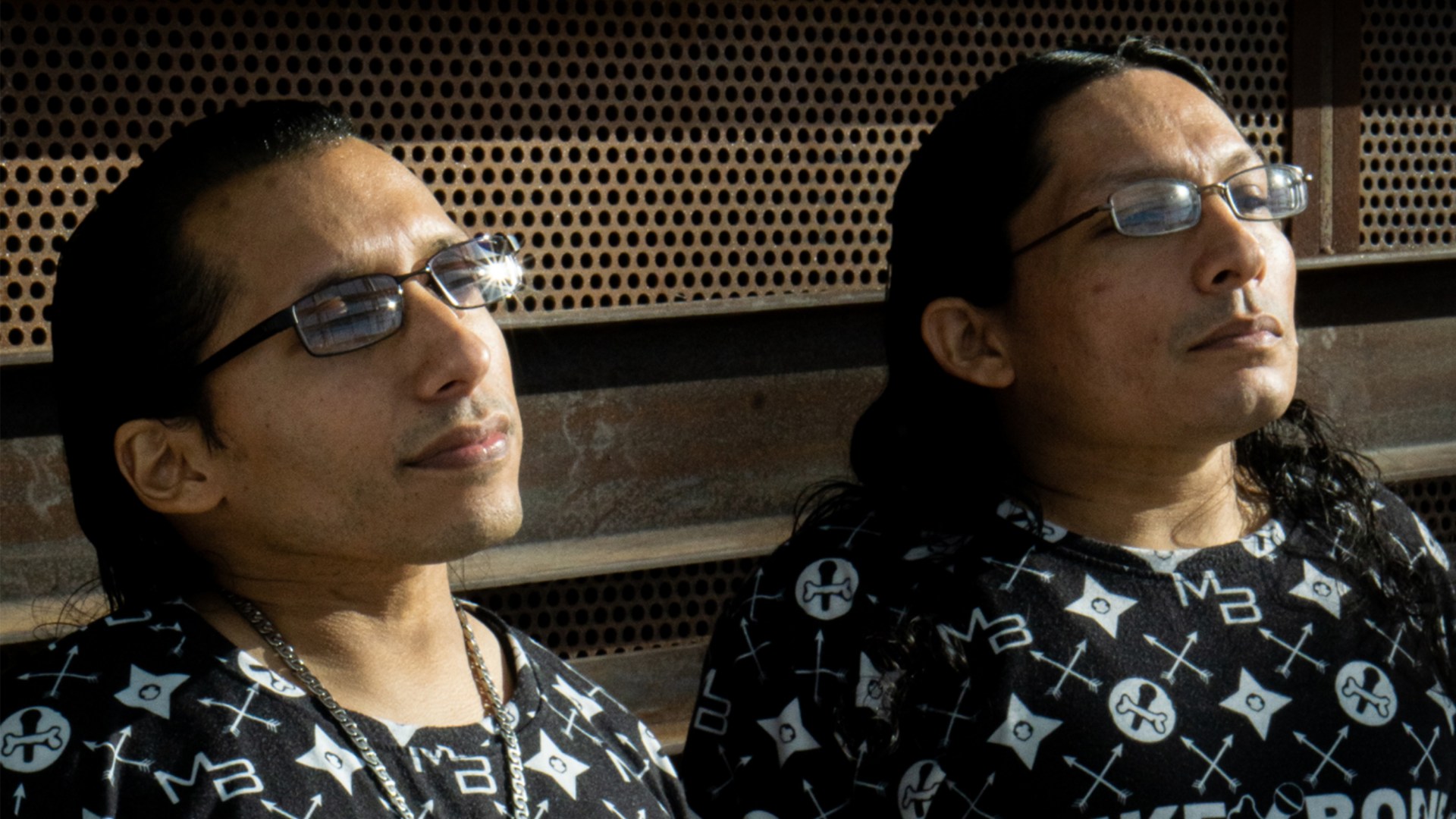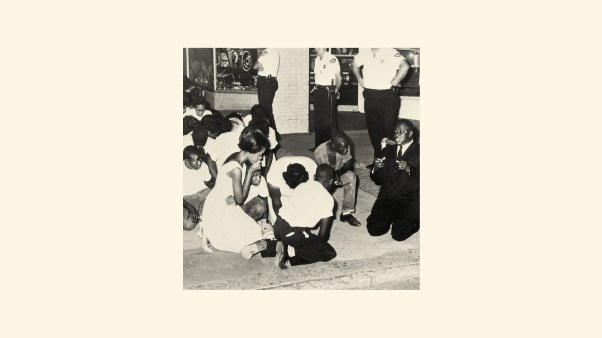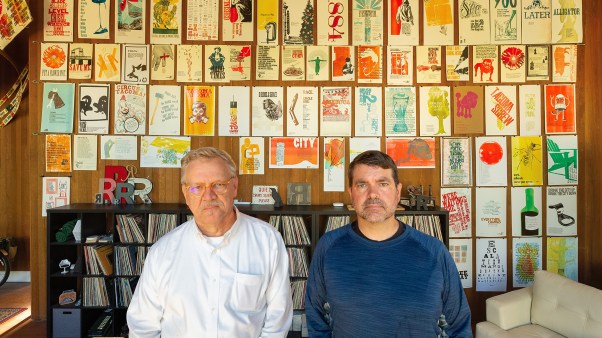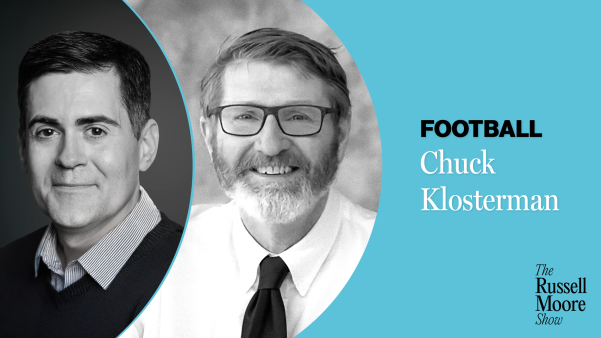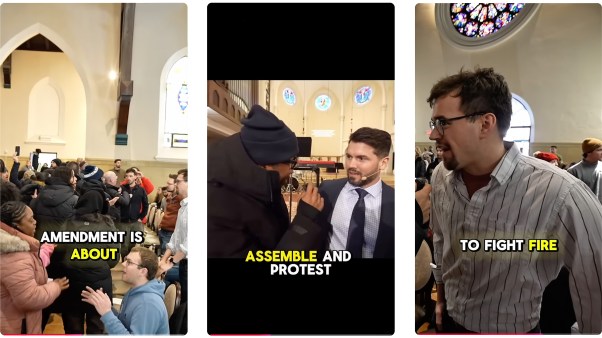When Lil Mike and Funny Bone (who perform as the hip-hop duo Mike Bone) auditioned for the television show Reservation Dogs, they never expected the series to gain much attention outside the Native American community.
Co-created by Sterlin Harjo and Taika Waititi, the show follows the lives of four Native American teens in Oklahoma and finds humor in some of the dark realities of reservation life. Now in its second season on FX, the critically acclaimed series received a Peabody and has been nominated for numerous other awards.
Fans of the show may not know that Lil Mike and Funny Bone—who appear as Mose and Mekko, respectively—have been Christian hip-hop artists for nearly 25 years. Using a style that draws together rap, dance, and comedy, they got their start performing at churches and house parties and eventually appeared on America’s Got Talent in 2013.
CT spoke recently with the duo about using music to fight Satan, throwing pajama parties for Jesus, and working on Reservation Dogs.
Some of our readers will be familiar with you through the show Reservation Dogs, but they may not know about your musical work and careers up to this point. How long have you been making music as Mike Bone, and how did you get started?
Lil Mike: So I started making music in 1992, and it was a form of therapy. I had anger issues. I would black out and try to hurt people. So, they told me, write out your problems instead of acting out. In 1997, we joined together. Funny Bone came and got in and did some comedy.
Funny Bone: Yeah, I would jump on stage and do something funny while he was switching out songs. And then I slowly started to write my own rhymes. I got some skits on different tracks where I’m like slapping Satan, making fun of Satan. It’s pretty hilarious. Like, “I just threw Satan off a cliff.”
Where were you performing when you were just starting out? What were the venues like?
Funny Bone: Churches, talent shows, nightclubs—any nightclubs we could that we could get, we were jumping in. House parties—we did a lot of house parties. Block parties.
We opened our own nightclubs, and they were strictly, like, teen nightclubs. No alcohol, no smoking. We wanted to do our own parties so we could play what we want. We were playing faith-based music.
Lil Mike: So we opened up a teen nightclub, and opening night, we did a pajama party. People was like, a little afraid to dance, you know, to Christian music. I started playing songs they had never heard before. But then after a while, people got loose. And I was like, “It’s okay to praise God and dance.”
We even made a mixed drink called Jesus Juice, and it was basically apple juice and orange juice and lemonade. No alcohol—we don’t do that. One church that hosted our nightclub was like, “We’ll stop in the middle of the nightclub and then have a service.” And we’re like, save service for Sunday!
When you started hosting these kinds of shows and dance parties, did you run into churches that were uncomfortable hosting you?
Funny Bone: Yeah, definitely. We got kicked out of a lot of churches.
Lil Mike: Yeah, I don’t know if you’ve listened to any of Funny Bone’s older stuff, but we tried to push the button. There was this song he did called “This One’s for Satan.” And we were rapping in church—
Funny Bone: And I dedicated it to the Devil.
Lil Mike: Some people would love it, and some people would hate it. But basically, he’s just dissing the Devil through the whole track.
Funny Bone: “Kicked Satan in the balls, had his nuts clappin’”?
Lil Mike: Yeah, that one. We would try to push the button. Some people have different ways of, you know, fighting against the Enemy. And for us, it was music.
Talk about how you came to faith.
Lil Mike: We grew up in the church. It was an Indian Southern Baptist church. It was very strict. The songs sounded kinda sad, and we were just, like, not really paying attention. I mean we were believers, but we weren’t really …
Funny Bone: Religious?
Lil Mike: Yeah, religious or whatever. And so, we was getting in trouble and stuff like that. And once we started to get our head on straight, we was like, “You know what? This church is cool, but we gotta go explore.” So, we would do something called church hopping, and we would visit different churches.
Funny Bone: Some of those churches were just robotic. You could tell, none of these people are feeling the Spirit. Like, singing about joy but they’re just sad singing, so sad and not moving.
Lil Mike: I mean, we got kicked out of so many churches ’cause, like, “You can’t treat Jesus like it’s a nightclub.” Or after going there for so long, they’d be like, “Now you’re members, and Jesus is trying to change you” or whatever. And we’re like, “Nah, dude, each disciple was different, homie. You ain’t gonna change the way I look just because I came to Christ. We all bang different.”
Then there was this one church we went to. We pull up to the parking lot, and all we hear is music, and I go, “Man, that’s rude. Somebody just gonna be sittin’ in the parking lot playing music.” And as soon as we opened the door, we realized the sound was coming from inside the church, and we walked around the corner, and it was a dance floor, party lights. And this was a Sunday morning. And there was dancing and break dancing and stuff like that. And we were like, “Oh, we home.”
Funny Bone: Yeah, it was pretty dope. Stayed there for a cool minute. Big shout out to Bringing the Fire in Oklahoma City.
As artists, you foreground your faith and your Native American identity. How did you come to fully embrace both of those parts of yourselves in your work?
Funny Bone: We’ve been in the faith for a long time, and we’ve felt the Creator Spirit personally. And it is powerful. That’s kind of what helps ground me, just knowing personally, feeling that touch from God. Whenever it’s looking bleak, whenever we going through struggles, not gonna worry about it, ’cause I know Creator has it. I know God’s got this. We have a song called “Ain’t Worried ’Bout It.”
A lot of people definitely need encouragement like that, especially in the indigenous community. They have the highest rates of suicide, depression. I got really close at one point. I’m not ashamed to say it. The Enemy was just attacking me. And the only thing that really kept me going was knowing that God has to have something better for me.
Are there particular parts of Scripture or biblical figures you resonate with?
Lil Mike: I really enjoy the Book of James. Sometimes I just open the Word and go to James and let it just fall out. And the words in red, man. Everything that Jesus said. Take that to heart.
Part of the reason why Reservation Dogs has been so celebrated and influential is that it elevates the Native American experience and centers performers from that community. What has it been like to be a part of that project?
Lil Mike: So, when we got on the show, we auditioned, and there were cuss words in the script. And we were like, “Yeah, we don’t cuss,” and they honored that for us. They let us rewrite a lot of the stuff too.
Funny Bone: They respected it and let us do our own little jokes and throw our own little swag in there. They’ve added writers of all types of backgrounds. It’s an honor to be part of something so monumental for the indigenous community.
Lil Mike: I never thought that it would get momentum outside of Indian country. So for everybody else to enjoy it …
Funny Bone: Yeah. It’s showing them who we really are as indigenous people, even through all the struggles and systematic oppression. We learn to kind of turn things and just laugh at it. That’s what’s kept us going.
Even before the TV show, a lot of your music was a form of activism or advocacy. How does that show up in your work these days?
Funny Bone: The song “Fist in the Air” is one of our first singles. It’s pretty recent, and it’s dedicated to raising awareness for missing and murdered indigenous people.
Lil Mike: And we have a song called “That’s Enough” about police brutality and racism. Talking about those subjects can be touchy with some folks, but we do feel obligated to use our platform to raise awareness. Any way we can help.
In the hip-hop and indigenous spaces you occupy, is Christian sometimes an uncomfortable label for the two of you?
Funny Bone: Very. I don’t wanna say that we get ashamed to call ourselves Christian, but amongst the indigenous community, there’s a bit of that. The colonizers stole a lot, including religion. So we try to tell the natives—just because that’s what colonizers are doing doesn’t mean that’s what Jesus stands for. They are manipulating the Word of God to get over on people.
Not everyone has good intentions. Some people are just wicked. If your Christianity allows you to hate somebody, then you’re doing it wrong. God is love.
Lil Mike: We’re just trying to stay grounded with our connection to Creator.
Funny Bone: God is love. Anything else is not of God.

